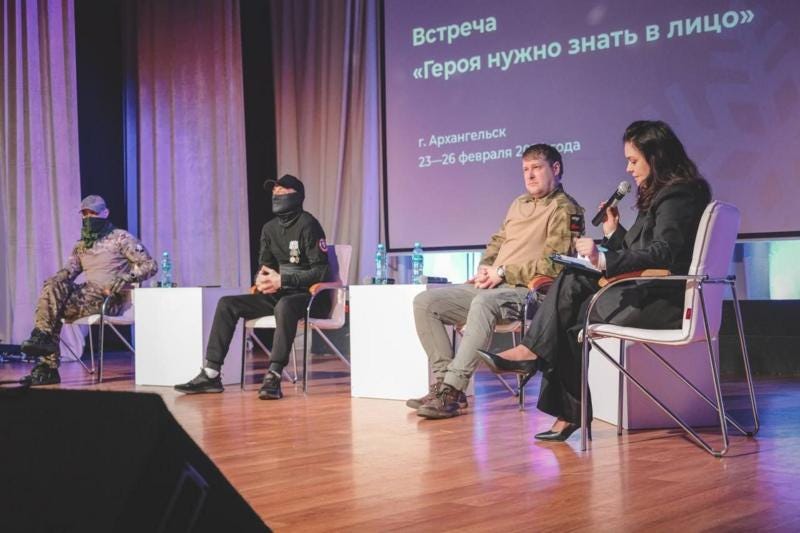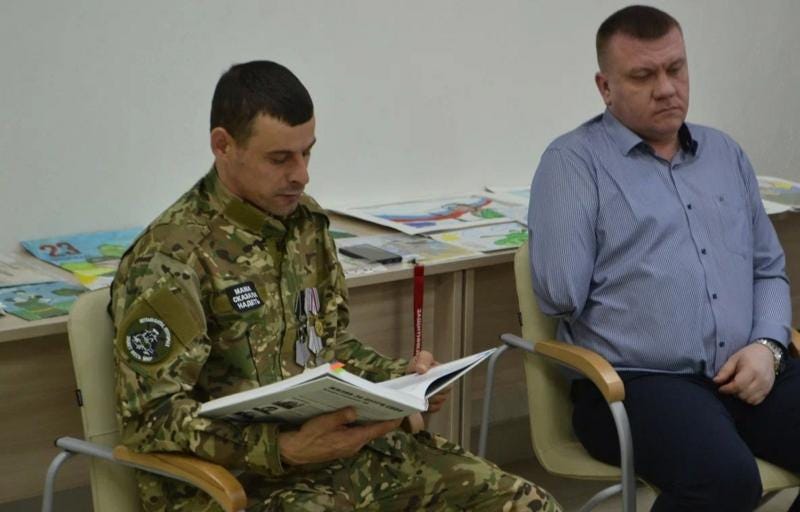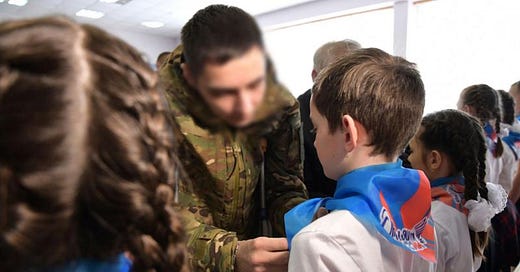"Lessons in Courage" - delivered anonymously. Veterans of the war in Ukraine pay visits to students and schoolchildren
Vladimir Putin has called on soldiers to work with youngsters. Billions of roubles have already been allocated to the task.
By Andrei Kozenko.
Throughout last month, meetings with participants of the ‘special military operation, the sole officially-approved designation of the war in Ukraine, took place in hundreds of educational establishments in at least forty regions of Russia, according to an analysis carried out by the BBC.
Sometimes the soldiers did not disclose their names or hid their faces behind masks. These ‘lessons in courage’ were led by serving personnel, mercenaries who had fought for the Wagner private military company, and men who had been called up and conscripted in the autumn of 2022, but who suffered injuries serious enough to prevent them returning to the front.
"Nothing personal: we were paid for it."
Fyodor Sadovnikov from the Irkutsk region volunteered to participate in the war with Ukraine, was severely wounded, and is now, in his words, engaged in the patriotic education of young people.
Last month, he addressed local schoolchildren, and then posted his thoughts on social media: “The truth is being deliberately distorted and stuffed into the heads of youngsters. This is why activities like ours, and the celebration of victory in the Great Patriotic War [WW2] is so important... And the more truthfully we, participants of military operations, can convey this to children, and tell them what the Motherland stands for, and why we need to defend her, the more peacefully we will all sleep.”
Non-state media outlets twice in February flagged up unusual events with schoolchildren and students carried out by participants in the war in Ukraine.
On February 12th, the ‘People of Baikal’ publication wrote that three mercenaries who had fought with the Wagner group came to School No.31 in the city of Ulan-Ude. They gave ‘lessons in courage’ to students of the sixth, eighth and ninth grades. They didn’t give their names, only their military call signs – ‘Arman’, ‘Galson’, ‘Gani’ and ‘Draug Lanspik’. The lesson was delivered by three men, who didn’t take off the balaclavas concealing their faces, but brought along a Wagner flag with the slogan “Nothing personal: we were paid for it” inscribed on it.
A similar event was held on February 24th at the Northern Federal University in Arkhangelsk, under the heading ‘Know the Face of a Hero’. Two of the participants of the war in Ukraine wore masks, and none revealed their full names. The soldiers were presented to the classroom as Dmitry, Viktor and Gennady. The ‘Sota’ outlet notes that the university administration supported the war and had sent away students who had spoken out against it.
“This isn’t an English or maths lesson. And instead of a classroom teacher at the blackboard, there’s a fighter from the 155th Guards Marine Brigade of the Pacific Fleet.
In the course of February, regional media and education authorities reported on more than a hundred such lessons and events. They were held in at least forty regions across Russia – both in local capitals and district centres – and the military participants at all of them were reluctant to show their faces or give their names. There may have been more lessons conducted – we are only able to speak about those that were mentioned in press releases or social media posts.
“Kamil, a medical instructor, told the students not only how he saved the lives of more than 1800 people, but also answered questions about what his plans for the future were,” reported state television in Khabarovsk, in Russia’s far east, about a meeting between a military representative and undergraduates at the Pacific State University. The man’s face, and the surname embroidered into his uniform, were both blurred out, and his voice was digitally altered. He gave an interview to state TV with his back to the correspondent and the camera. What his plans for the future were didn’t make the edit.
“Fifth graders at Gorelskaya school were paid a visit by a Tambov veteran from the special military operation with the call sign ‘Beeline’,” reads a report by ‘Pritambovye’.
“Nikolai... told how Russian fighters are bravely and heroically serving on the front line,” it goes on to say. “The schoolchildren asked lots of questions about daily life at the front, about the way Russian soldiers treat enemy prisoners, and also about how the veteran got a serious wound. Nikolai doesn’t hide the fact that he received it in clashes near the town of Izium. He stepped on an anti-personnel mine while carrying out his orders.”

Combat brotherhood and strength of will
“This isn’t an English or maths lesson. And instead of a classroom teacher at the blackboard, there’s a fighter from the 155th Guards Marine Brigade of the Pacific Fleet. He has come to give the kids a lesson in courage. After all, his knowledge of the front lines was acquired first hand," says a report on ‘Primorye Public Television’ in Vladivostok.
“The questions are far from childish. Marine Denis Shlobut answered them all, and spoke of team spirit, helping each other out, and the importance of every soldier in carrying out a common task.”
State television in Mordovia reported on a lesson held at a school in the regional centre of Ruzayevka by an interior ministry special forces fighter and volunteer, Vitaly Chudayev. "The kids listened attentively to the veteran and asked questions. They asked what he dreamed of being in childhood, and what sports he plays. When asked if he received letters written by schoolchildren, Vitaly answered “Yes. We read them with great emotion. Your messages lifted our fighting spirit. The words ‘We are waiting for you at home!’ were the most important and most necessary for us.’”
In all of these reports and press releases, what the soldiers actually said to the schoolchildren or students is left very vague. The ‘lessons in courage’ focus on such things as ‘combat brotherhood,’ ‘life experience,’ ‘bringing up the younger generation properly,’ ‘courage and strength of will,’ and other topics in the same vein.

‘Lessons in courage' in Russian schools appeared roughly a decade ago. They enabled representatives of various law enforcement agencies to address the children — from veterans of the Ministry of Internal Affairs, to employees of the Ministry of Emergency Situations, who used to talk about fire prevention.
But as of 2023, invitations to combat veterans to speak in schools have been of a more private nature. At least once, it has led to a major row. In August, one of the parents, himself a veteran of the wars in Chechnya, suggested bringing ‘special military operation’ veterans into School No.12 in Perm, which specialises in intensive German studies and has joint programmes with Germany.
When the school administration refused his idea, the parent complained to the regional education department. The outcome was that ten teachers and the headteacher resigned, but the lesson by the military was held, the joint programmes with Germany were called off, and secret service officers came to invigilate the German language exams.
“Defenders of the Fatherland” and their billions
While nowadays there is no resistance among teachers to speak of, there is also very little impact from the lessons. The BBC has looked through dozens of social media posts from the schools themselves, city and regional committees, and education departments. They get three or four likes each and no comments at all.
The Russian Ministry of Education, which is in charge of secondary education, has not publicly initiated the ‘lessons in courage,’ although it clearly takes a pro-war stance. The minister, Sergei Kravtsov, handed out awards in December to teachers who had fought in Ukraine. And last month, he gave his support to a project to circulate war stories in schools under the general title ‘Knowledge. Heroes,’ and devoted to the exploits of participants in Russia’s ‘special military operation’.
Vladimir Putin announced in his ‘Direct Line’ media event in December that ‘special military operation’ veterans would be called upon to work with young people.
In roughly half of cases, regional branches of the ‘Defenders of the Fatherland’ foundation are named as co-organisers of the ‘lessons in courage’. Its central branch calls itself a state body, but doesn’t specify which government department it belongs to. It is headed by Anna Tsivileva, the wife of the Kemerovo region governor, Yevgeny Tsivilev. The ‘Proekt’ investigative website has been able to establish that Anna Tsivileva is Putin’s second cousin.
In June, the foundation was gifted a 1.3 billion rouble grant by the Russian government, almost all of which it spent on itself – on salaries and setting up regional outposts. In September, the government promised it another five billion.
Judging by its website, the foundation is involved in all manner of support for those taking part in the war in Ukraine, from medical treatment to help filling out documents.
There is no mention on the website of work in schools, but it does state that the foundation is involved in “perpetuating the memory of participants in the special military operation and their heroic exploits,” as well as “historical and cultural education about them.”
The ‘Defenders of the Fatherland’ foundation did not respond to BBC bids for comment on the ‘lessons in courage.’
We managed to identify on social media eight of the military personnel who had delivered these ‘lessons in courage’ in February. None of them replied to our request that they share with us their experiences of working with children and teenagers.
BBC is blocked in Russia. We’ve attached the story in Russian as a pdf file for readers there.
Read this story in Russian here.
English version edited by Chris Booth.





This appears to be taken straight out of Soviet Communist party ideology department textbooks, but looks much more sinister